2015 Annual Meeting Program Theme

Marlese Durr
SSSP President (2014-2015)
Removing the Mask, Lifting the Veil:
Race, Class, and Gender
in the 21st Century
“We wear the mask that grins and lies,/ It hides our cheeks and shades our eyes,-/… Nay, let them only see us, while/ We wear the mask.” Paul Laurence Dunbar 1896
“Surely there shall yet dawn some mighty morning to lift the Veil and set the prisoned free.“
W.E.B. Du Bois 1903
On January 20, 2009, with the inauguration of Barack Obama as the 44th President of the United States, perceptions were that his election was the first fruit of seeds sown during the 1960s to the present. We were moving into the second decade of the 21st century, with an ambitious social, cultural, and economic agenda based on racial, ethnic, and gender equality. For a majority of citizens, the mask of bigotry could be removed, and the veil of discrimination lifted.
Against this backdrop, the Taxed Enough Already (TEA) Party, American Legislative Exchange Council (ALEC), American Crossroads, and Americans for Prosperity, alongside like-minded groups, effortlessly tapped into a thinly veiled sentiment of how to sustain and embolden inequality as an American virtue. This was accomplished by calling for grassroots organizations to become confederates with political action committees to fight progressive legislation seeking to illuminate and redress financial concerns of the middle class, the provision of healthcare to the uninsured, and pathways to citizenship for undocumented children and adults.
Additionally, this political strategy built impasses via dog whistle sound bites against racial and sexual equality, and women’s reproductive rights. In the face of this opposition, the Presidency was on display, as we watched a series of cloture skirmishes, filibusters, and obstructions to a forward-thinking agenda. So, despite the veil being lifted, it appeared to stall and begin dropping, as homophobia, colorblindness, backstage racism, and economic inequality intensified. For me as well as many others, removing the mask and lifting the veil had become one of the hardest tasks to begin as we remained cautious in “picking our battles,” hoping we have triaged correctly.
What became clear to me, was if Dunbar felt we were wearing the mask that grins and lies in the 19th century, and Du Bois felt “the problem of the 20th century was the color line,” the disenfranchised we of the 21st century are persons of color, lesbian, gay, and transgendered, naturalized, unemployed, middle-class, and the poor. For example, a June 2014 Catalyst article, reports that Women of Color must reduce their ambitions due to bias. The 2010 Census confirmed that Women of Color still make substantially less than White women, thereby delaying their social mobility. Both they and their male counterparts, in turn, have been hit especially hard by the near depression and recession. While Latinas/os and immigrant-rights activists could claim a small victory when President Obama issued an Executive Order in 2012 in support of the Dream Act, immigration legislation has been postponed again, and Latinas/os, too, suffer economic woes much more severe than whites’. Scientific research funding is under attack as never before, making it much more difficult for Academics of Color to publish and to advance in their profession, and the lesbian, gay, transgender, and queer communities continue to work for marriage equality. The delicate political coalitions that have been formed by these groups around parallel social agendas implode and explode as significant change continues to be elusive, despite the 239 years of incremental progressive change since the signing of the Declaration of Independence in 1776.
Consequently, as suddenly and decisively as Obama’s election and the electoral directive arrived, he and it were faced with contests that left constituents for and of change bereft and asking: How do we remove the mask and lift the veil? What are consequences of doing so? How will they benefit a society in need of repair and reconciliation? On the other hand, I along with others ponder whether expanding our 50 years (1964-2014) of laboring to locate and eradicate separate, but imbalanced precepts within our democratic society, will cause many to keep the mask in place and never lift the veil. Then again, the words of Dunbar and DuBois echo in our minds as we continue to contemplate removing the mask and lifting the veil.
In preparing to convene our 2015 meeting in Chicago, we invite scholars, scholar-activists and practitioners to examine the issues of race, gender, and class in the first decade and a half of the 21st century to locate avenues to continue the progressive work they have begun, by investigating fractures in building a culture free of “isms.” As scholars in pursuit of a just society, what we offer at this time of historical change may alter the most pressing problems carried across centuries.
Marlese Durr, SSSP President
Wright State University
|
2015 Program Committee |
Credit: Choose Chicago
|
|
David G. Embrick, Loyola University, Chicago (Co-Chair) David L. Brunsma, Virginia Tech |

